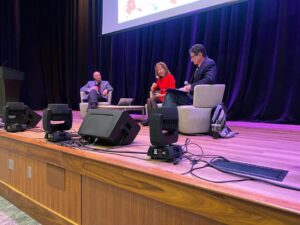
Civil Conversation Series Sunday at library | Hot Springs Sentinel Record
The next program in the Civil Conversation Series by Braver Angels Arkansas, hosted by the Garland County Library, will be held from 2-4 p.m. …

The next program in the Civil Conversation Series by Braver Angels Arkansas, hosted by the Garland County Library, will be held from 2-4 p.m. …

… Braver Angels , the American Cancer Society Action Network, and the Leukemia and Lymphoma Society. Sophia is also an Institute for Youth in Policy …

She is also the state coordinator for Braver Angels , a national grass-roots organization that works on depolarization, and she co-leads a local …

1 thought on “BOOK REVIEW: Listen, Liberal: or Whatever Happened to the Party of the People?”
I strongly recommend reading “High Conflict” by Amanda Ripley. I’m including the Amazon review here. She even mentions Braver Angels towards the end of the book as an organization that’s helping to depolarize America.
“When we are baffled by the insanity of the “other side”—in our politics, at work, or at home—it’s because we aren’t seeing how the conflict itself has taken over.
“That’s what “high conflict” does. It’s the invisible hand of our time. And it’s different from the useful friction of healthy conflict. That’s good conflict, and it’s a necessary force that pushes us to be better people.
“High conflict is what happens when discord distills into a good-versus-evil kind of feud, the kind with an us and a them. In this state, the brain behaves differently. We feel increasingly certain of our own superiority, and everything we do to try to end the conflict, usually makes it worse. Eventually, we can start to mimic the behavior of our adversaries, harming what we hold most dear.
“In this “compulsively readable” (Evan Osnos, National Book Award-winning author) book, New York Times bestselling author and award-winning journalist Amanda Ripley investigates how good people get captured by high conflict—and how they break free….
“People do escape high conflict. Individuals—even entire communities—can short-circuit the feedback loops of outrage and blame, if they want to. This is an “insightful and enthralling” (The New York Times Book Review) book—and a mind-opening new way to think about conflict that will transform how we move through the world.”